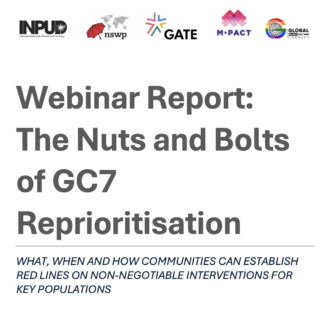Around the world, trans-led organizations rely on Global Fund funding to provide access to life-saving care for our community members. The Global Fund grant revision and reprioritization process is therefore a critical moment for our communities to ensure their inclusion in the revised country grants.
The Global Fund to Fight HIV, TB and Malaria is one of the most important international health funders. Due to the ongoing challenges in international donor funding, the Global Fund has less funding available for national grants in the current grant cycle and is undertaking a grant revision and reprioritization process to ensure continued access to life-saving care in the context of limited resources.
By 30 June 2025, all Principal Recipients and Country Coordinating Mechanisms will receive letters from the Global Fund, providing details of the reduction in funding for each country grant.
Between 30 June and 15 July, there will be a short window of opportunity to engage with your Country Coordinating Mechanism to ensure continued funding for programs that provide access to life-saving care for our communities.
There is also a possibility of including essential services that have been disrupted by previous international donor funding cuts.
GATE has compiled a list of useful resources to support trans-led organizations in motivating the continued inclusion of community-led, trans-focused health programs in Global Fund grants. Access to life-saving care is not negotiable!
Resources for engaging with the Global Fund grant revision and reprioritization process
- Protocol for Reporting Barriers and Abuses of Process: In some countries, a lack of community engagement and abuses of process could lead to communities losing access to vital care. The Communities Delegation to the Global Fund has set up a reporting process to allow constituents to report communication barriers, participation barriers, human rights violations and other serious problems during the grant revision and reprioritization process.
- Grant Adaptation Measures for Global Fund Grant Cycle 7. A Guide for Communities: The Global Fund LAC Platform/Plataforma LAC has compiled a useful guide to the grant revision and reprioritization process, looking at the two-pronged approach by the Global Fund to temporarily pausing select components of grant implementation until funds are received (“slowing down”) and reducing a portion of national grant budgets while reassessing and prioritizing key interventions (“reprioritization and revision”).
- The CCM Dashboard, a centralized hub for accessing Global Fund data: This civil society dashboard provides useful information on Global Fund country grants and country coordinating mechanisms (CCMs). Built as a resource for CCM members, community advocates, and all stakeholders, this platform aims to provide straightforward navigation of data about CCM governance, grant funding, and performance, with the aim of facilitating informed decision-making and evidence-based advocacy.
- Key Population Webinar Report: The nuts and bolts of Grant Cycle 7 reprioritzation: On Friday May 30, 2025, GATE along with other global key population networks INPUD, NSWP, MPact, and GBGMC hosted a webinar to share the latest information on the Global Fund’s reprioritisation and revision process. This report is a summary of the webinar consultation looking at key themes for what is ‘essential’ for the health and well-being of our communities.
- WE INSIST! Non-Negotiables for and by Key Populations in the Reprioritisation and Revision of Global Fund Programmes in Grant Cycle 7: This report highlights the non-negotiable elements for key population communities in the grant reprioiritization process, which can be adapted/modified to fit differing country contexts. This is available in English, Arabic, Spanish, French and Russian.







